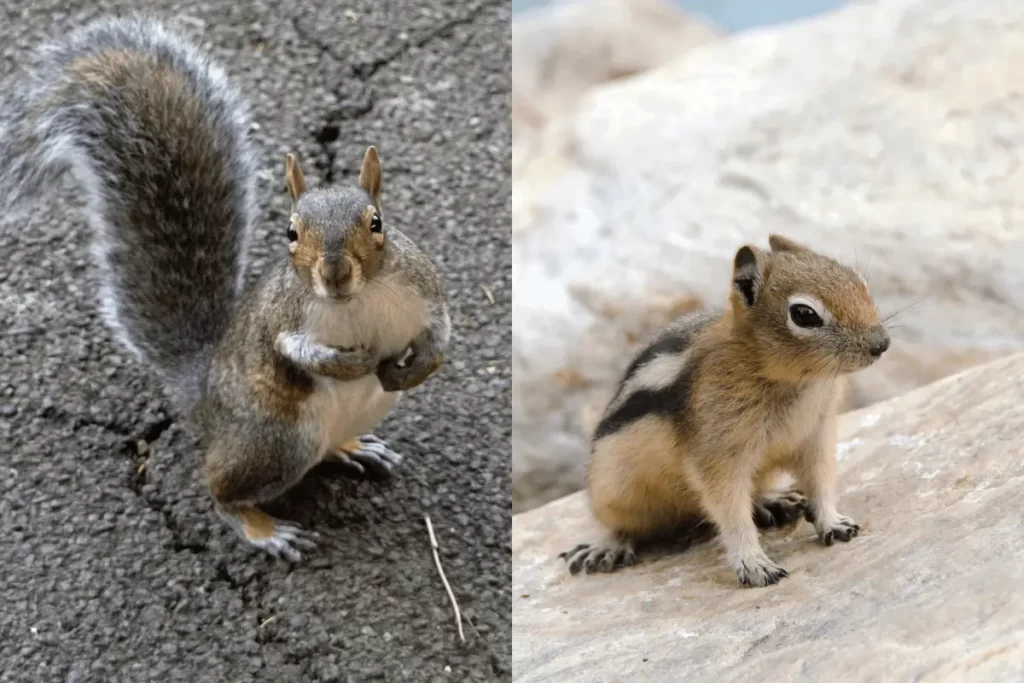The chipmunk’s primary form of defense is to avoid predators. In response to squirrel alarm signals, he will warn other chipmunks, to flee, stay in his burrow, and change his activities. Chipmunks and squirrels are distant cousins that have drifted further apart over millions of years. But do squirrels kill chipmunks?
Yes, squirrels kill chipmunks, especially red squirrels are their predators. However, chipmunks are predated by other predators too, depending on their location and environment.
Since chipmunks are tiny and unable to defend themselves, avoiding danger gives them the best chance of surviving. Read more about squirrels and chipmunks in the below article.
Chipmunk Vs Squirrel

The chipmunk is among 25 species of squirrels. Its skin is striped along with large cheek pouches used for eating and storing food. Other physical features include large eyes and ears, furry tails, and delicate claws.
Except for one, they are all North American and only active during the day, occurring in areas ranging from southern Canada to west-central Mexico. Most species have body lengths ranging from 8 -16 cm and tail lengths ranging from 6-14 cm.
Squirrels, like other rodents, have four front teeth that are constantly growing to prevent wear and tear from constant chewing. The squirrels that are most frequently observed gracefully scurrying and leaping from one tree to another tree are known as tree squirrels.
Other species include ground squirrels, which live in burrow or underpass systems and hibernate during the winter. A third, adaptable species of squirrel is the flying squirrel. Although they cannot fly, they can move across the sky quite effectively. They live somewhat like birds do, in nesting sites or tree holes.
Are Chipmunks Afraid Of Squirrels?
Because they share a territory, are terrified of attack and potential death, and lack the energy and biting prowess to defend themselves, chipmunks are terrified of squirrels.
Additionally, their similar food addiction, lack of natural defenses, and small stature make them frightened. They flee quickly out of fear of all squirrels.
They are also afraid due to a lack of hiding places, nutrition competition, reduced growth due to no hibernation, and the loss of stored food. However, due to the squirrel’s jealousy and genetic adaptations, the two rodents never get along.
The chipmunks’ small bodies and limited immunity also prevent them from competing with their natural predators. In addition, the squirrels regularly engage the rodents in battle in backyard gardens before eating and killing them.
Do Squirrels Fight With Chipmunks?
Chipmunks and squirrels coexist. They build their houses separately; they shop for food and store it in different places.
A squirrel and a chipmunk do not mate. Female squirrels and chipmunks only mate with male squirrels. There is nothing to bring them together, so they will not fight for a mate.
Squirrels are aggressive defenders of their home range and are territorial creatures. When it comes to territoriality, chipmunks are no different than squirrels. So, if either of these two rodents enters the other’s territory, a conflict will undoubtedly result.
That is the main cause of a fight between a squirrel and a chipmunk. When the mothers believe their children are in danger, this can also lead to conflict. Squirrels and chipmunks are capable of fighting to protect their young.
Squirrels typically win fights because they weigh more and get bigger than chipmunks; however, this is not always the case.
Do Squirrels Keep Chipmunks Away?
Yes, Squirrels keep the chipmunks away. Both animals are members of the same family and have identical genetic adaptations. They never get along, however, because squirrels are envious of chipmunks.
By pursuing and killing the chipmunks, they also lessen food and territorial competition. The squirrels bite and rip the bodies off the animals before eating them.
They also share ancestors and physical characteristics. However, the squirrels attack them quickly and viciously because they are aggressive toward chipmunks.
They are afraid of the squirrels around them and rely on their speed. They are swift creatures that can vanish from one place in a matter of seconds. Due to their lack of strength and inadequate attacking abilities, they avoid fighting and other conflicts.
Do Squirrels And Chipmunks Get Along?
Yes, squirrels and chipmunks get along because chipmunks are descended from squirrels. Chipmunks and squirrels (tree squirrels) are members of the identical Sciuridae family.
The most recent common ancestor of chipmunks and squirrels, which are like distant cousins, lived more than 20 million years ago. Indeed, distant cousins!
However, there are numerous distinctions between squirrels and chipmunks. Chipmunks are much smaller than ground squirrels, who also have a longer, bushier tail than chipmunks do.
While squirrels are typically found above ground in trees and grasslands, chipmunks frequently live underground in burrows and tunnels.
Another distinction between ground squirrels and chipmunks is their physical appearance. While these two rodents may appear to be very similar, especially because they are members of the same family, there are some important differences to note.
For instance, compared to chipmunk ears, the ears of ground squirrels are smaller overall and located closer to the head. Squirrels also have huge bushy tails, whereas chipmunk tails are much smaller.
Do Squirrels Eat Chipmunks?
Not all species but red squirrels do attack and kill chipmunks, however, it’s unlikely red squirrels eat chipmunks. Red squirrel habitat in trees whereas chipmunks mostly live on the ground. So there are very few chances that they encounter each other but they can fight over birdfeeders.
What Animals Other Than Squirrels Can Kill Chipmunks?
Chipmunks are cute little creatures. Humans aren’t the only ones who enjoy seeing chipmunks. Many different animal species view chipmunks as delicious snacks and excellent food sources.
Chipmunks play several important roles in the ecosystem, one of which is providing food for other animals.
Predatory mammals like foxes, wolves, and coyotes, as well as birds of prey like hawks and owls, eat chipmunks. Some species are also actively pursued by snakes.
Chipmunks have evolved a system of communication that enables them to alert one another to the presence of a predator and the location of the threat, whether it is on the ground or in the air.
Many mammals’ diets include chipmunks and other rodents. The Colorado Division of Wildlife estimates that 70 percent of coyotes’ diets consist of chipmunks, mice, squirrels, and rabbits.
Furthermore, domesticated cats and dogs are two other notable mammalian predators of chipmunks.
Conclusion
Chipmunks and squirrels live together. They build their houses separately; they shop for and store their food in different locations. A squirrel and a chipmunk do not have children. Male squirrels mate with female squirrels and chipmunks. They will not fight for a mate because there is nothing to bring them together.
Squirrels are territorial and aggressive defenders of their home range. Chipmunks are territorial in the same way that squirrels are. As a result, if either of these two rodents enters the territory of the other, a conflict is unavoidable. Chipmunks are terrified of squirrels because they share a territory.
When a chipmunk is compared to a squirrel, it is discovered that the chipmunk is smarter. This may come as a surprise to you, but it is true due to their nature. Although both animals are intelligent and intelligent, the chipmunk outperforms the squirrel.
References
Brunner JL, Duerr S, Keesing F, Killilea M, Vuong H, Ostfeld RS. An Experimental Test of Competition among Mice, Chipmunks, and Squirrels in Deciduous Forest Fragments. PLoS One. 2013 Jun 18
